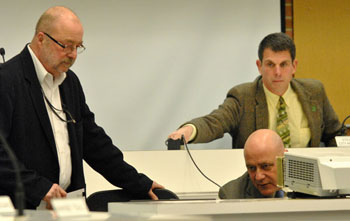Round 1 FY 2014: 15th District Court
Ann Arbor city councilmembers were briefed on the 15th District Court as part of a Feb. 11 work session. Last Monday’s meeting kicked off a series of such sessions that will provide information to the council as it looks toward its second meeting in May, when councilmembers will set the budget for the next fiscal year.

From left: 15th District Court administrator Keith Zeisloft, Ann Arbor city administrator Steve Powers, 15th District Court judge Joe Burke. Before the meeting, the men were setting up a slide presentation. (Photos by the writer.)
All three judges of the court attended the session and addressed the council: Elizabeth “Libby” Hines, Chris Easthope and Joe Burke. Court administrator Keith Zeisloft also attended the session, but did not formally address the council.
At around $3.7 million, the 15th District Court’s budget makes up roughly 4.5% of the city’s general fund – which is in the range of $80 million. The budget for the 15th District Court has decreased from a high of $4.2 million in 2009. Staffing levels of the court, according to the city’s comprehensive annual financial reports, have decreased from 41 in the early to mid-2000s to 36 FTEs for the FY 2012 budget year.
The district courts handle all civil claims up to $25,000, including small claims, landlord-tenant disputes, land contract disputes, and civil infractions. Washtenaw County has three district courts – 15th District Court for the city of Ann Arbor, 14B District Court for Ypsilanti Township, and the 14A District Court (with four physical venues) for the rest of Washtenaw County. Ann Arbor’s 15th District Court also handles preliminary exams for felony cases – which do not show up in official court statistics.
Part of the basis for the court’s presentation to the council was a recent report from the State Court Administrative Office. It includes metrics on the number and kinds of cases handled by the court, as well as collection rates. The judges focused their remarks, however, on the “problem-solving” programs of the courts – those that address sobriety, homelessness, veterans issues and domestic violence. This article includes vignettes from a session of the sobriety court attended by The Chronicle.
Other topics covered during the Feb. 11 work session included the city’s capital budget and the Ann Arbor Housing Commission. Presentations on those topics will be covered in separate Chronicle reports.
The substantive conversation about the budget and its relation to the council’s established priorities is expected to begin to unfold at the council’s March 11 work session. Before then, a second work session is scheduled for Feb. 25, with an additional session slated for March 25, if necessary.
City administrator Steve Powers is required by the city charter to submit his proposed budget to the council by the second council meeting in April, with any council amendments required by the second meeting in May. The city’s fiscal year begins July 1. [Full Story]



